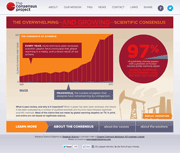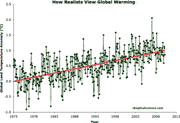Skeptical Science New Research for Week #43, 2019
Posted on 29 October 2019 by Doug Bostrom
62 articles, 11 open access
[Late breaking]
A few hours after "finishing" this edition of New Research, Nature Communications published a reassessment of SLR-driven coastal flooding hazards, New elevation data triple estimates of global vulnerability to sea-level rise and coastal flooding by Kulp & Strauss. The authors identify systematic problems with Shuttle Radar Topographic Mission (SRTM) DEM (digital elevation model) data and DEM products based on the SRTM data product. This family of DEM products support key inputs into estimates of human populations and cultural features at risk from increased coastal flooding due to SLR. Given that Kulp & Strauss are proposing a substantial difference in affected population, we can be sure that this work will be closely attended not only in the popular press but by other researchers studying the same subject.
Close to home
In their article The truth is not in the middle”: Journalistic norms of climate change bloggers, Christel W. van Eck and coauthors examine practices of climate change bloggers, comparing climate blogosphere journalism to more traditional news media. From the article introduction in Global Environmental Change:
The results show that climate change bloggers support the traditional journalistic norms of personalization, dramatization, novelty, authority and order, but not balance. Beyond the traditional journalistic norms, climate change bloggers identify contextualization, clarity, decency, and particularly truth as important journalistic norms. Truth is understood as a multi-dimensional norm comprising objectivity, transparency, and honesty. No differences are identified between norms supported by climate sceptical and climate mainstream bloggers, but each group operationalizes the norms differently.
The paper features many ships, crew and cargo familiar to those plying the climate blogging ocean. Beyond the immediate research results, the paper's backgrounding discussion is a fascinating look into a feature of human culture created almost entirely as a incidental effect of policy friction introduced by entrenched industrial interests. We're reminded by this article of how climate blogging has traditionally been most centrally concerned with arguing over the equivalent validity of "2+2=4," with a tiny but dedicated group of variously motivated self-described iconoclasts dissipating energy, patience and time otherwise better employed elsewhere.
A difference between traditional journalism and what we read in blogs emerges in van Eck et al: blog authors are less attached to the notion of "balance" as an overriding objective. In particular, we read that for bloggers not trading in science fiction, defying the laws of physics by attempting to synthesize "balance" where it cannot be found is subordinated to slavish devotion to reality.
We can also see that there's certainly more than a little dark absurdity woven into the fabric of the climate blogging world; quoted in the paper, Peter Sinclair is barely attaining hyperbole when he remarks “If one side of the issue is that the sky is blue and the other side of the issue is the sky is purple with pink polka dots, those are not two sides that deserve equal weight.” To be having the discussion implied by Sinclair's analogy is tragicomic but he's not really exaggerating the weird parameters of the conversation. There's no turning down the responsibility to counter comically silly arguments when those arguments pose a serious threat to obviously necessary changes and hence more or less we're all made fools, unavoidably.
Fading hostile environment?
Swerving over to what might be termed "operational journalism," in Reporting on climate change by broadcast meteorologists: A national assessment Kristin Tim et al report on television meteorologists' experiences and expectations of communicating climate change matters to their audiences, in the Bulletin of the American Meteorological Society. The paper denotes solid progress in this area, with broadcast meteorologists better equipped to communicate this important topic to viewers and increasingly doing so.
A particularly interesting finding is that compared to their reportage a decade or more ago, broadcasters both fear this communication job less and do indeed find little reason to worry about negative feedback from viewers. Even so, a proportion of personalities still feel impelled to shrink back:
Most weathercasters who had reported about climate change on air indicated they received either positive viewer feedback or little feedback (61.9%); conversely, weathercasters who had not reported about climate change expected to receive mostly negative feedback (44.2%).
Cranky remarks about climate change have long been a conspicuous feature in newspaper comment threads, to the point of being a joke. Given the enthusiasm and locally concentrated levels of participation in this activity we see, it intuitively seems the case that journalists and broadcast meteorologists may have found themselves conditioned to avoid talking about climate, being sure of facing a dismal stream of abuse whenever they raised their head above the parapet. It's encouraging to read evidence suggestive of this fringe activity being pushed ever farther to the edges of the Bell curve of likely hobbies to pursue. Perhaps we may one day be able to move on, secure in the knowledge that needful public policy isn't accidentally being shaped by understimulated and underinformed idlers seeking kicks.
Articles:
Physical science of anthropogenic global warming & effects
Marine Ice Cliff Instability Mitigated by Slow Removal of Ice Shelves
Northern Hemisphere Stationary Waves in a Changing Climate (open access)
Observation of global warming & global warming effects
Enhanced El Niño?Southern Oscillation variability in recent decades
Contribution of global warming and urbanization to changes in temperature extremes in Eastern China
Global trends of sea surface gravity wave, wind and coastal wave set-up
Cold waves are getting milder in the northern midlatitudes (open access)
Modeling global warming & global warming effects
Kilometer-scale climate models: Prospects and challenges (open access)
Effect of climate change over landfalling hurricanes at the Yucatan Peninsula
A Speed Limit on Ice Shelf Collapse through Hydrofracture
Impact of future warming and enhanced [CO2] on the vegetation?cloud interaction
Decline in Atlantic primary production accelerated by Greenland ice sheet melt
Understanding the atmospheric temperature adjustment to CO2 perturbation at the process level
Predicting future climate at high spatial and temporal resolution
Humans dealing with our global warming
Reporting on climate change by broadcast meteorologists: A national assessment (open access)
The work after “It's too late” (to prevent dangerous climate change)
It's not too late to do the right thing: Moral motivations for climate change action
Revisiting climate ambition: The case for prioritizing current action over future intent
Never too soon, always too late: Reflections on climate temporality
Adaptation to climate change in coastal communities: findings from seven sites on four continents
Microbial insurgency: Theorizing global health in the Anthropocene
Afforestation for climate change mitigation: Potentials, risks and trade?offs
“The truth is not in the middle”: Journalistic norms of climate change bloggers
Climate change and migration: Is agriculture the main channel?
How will climate change shape climate opinion? (open access)
Public perceptions of how to reduce carbon footprints of consumer food choices (open access)
Residential carbon emission embedded in China's inter-provincial population migration
Greenhouse mitigation strategies for agronomic and grazing lands of the US Southern Great Plains
Club convergence of sectoral CO2 emissions in the European Union
Biology and global warming
Climate change shifts in habitat suitability and phenology of huckleberry (Vaccinium membranaceum)
Range margin populations show high climate adaptation lags in European trees
Defining CO2 and O2 syndromes of marine biomes in the Anthropocene
Upwelling buffers climate change impacts on coral reefs of the eastern tropical Pacific
Towards more predictive and interdisciplinary climate change ecosystem experiments
CO2 and other GHG flux monitoring
Special:
Radiative Influence of Horizontally Oriented Ice Crystals over Summit, Greenland
Reconstructed global monthly land air temperature dataset (1880–2017) (open access)
Suggestions
Please let us know if you're aware of an article you think may be of interest for Skeptical Science research news, or if we've missed something that may be important. Send your input to Skeptical Science via our contact form.
A list of journals we cover may be found here. We welcome pointers to omissions, new journals etc.
The previous edition of Skeptical Science New Research may be found here.































 Arguments
Arguments































This Report should be included in next week's New Research list, but deserves special notice.
New elevation data triple estimates of global vulnerability to sea-level rise and coastal flooding
Credit to the New York Times for reporting on it so quickly.
I should have linked the NYTs article in mention in my earlier comment.
Here it is: Rising Seas Will Erase More Cities by 2050, New Research Shows
Thank you, OPOF (if that contraction is OK).
After boggling over the figures this morning: "how did I miss it??" It was published about 12 hours after the final sweep for #43. There's no value in being too rigid and it's quite important not least because it'll be scrutinized heavily so I'll just add it now.
But it seems worth a blog post of its own. The paper appears to be bad news given the limitations of foundational SRTM data and the plain, crisp way the authors are able describe those.
Oddly enough I have some experience dealing with SRTM data on a practical level in a way that lends me confidence in the article, that of establishing microwave transmission paths in some challenging locations under tricky requirements and heavily dependent on a DEM with SRTM underpinnings. What SRTM claims is indeed heavily affected by "ground truths" in the form of vegetation and (rarely in our case) structures. It was fairly easy to see the limitations of the corrections applied to our particular SRTM-derived DEM when we checked optical paths as part of the RF path verification process. In our case the main problems manifesting from this had to do with Fresnel interference being a threat where by DEM it shouldn't.
doug-bostrom,
OPOF is indeed OK.
I also get the point of the new report. But, my personal experience with the issue is less high tech.
This was an issue with stereoscopic aerial photogrammetry. You could fairly easily determine the elevations of what was visible. What was harder to determine was ground level under what was visible from above. Lidar was better, but not if the growth canopy was dense.
It has been known for a long time that estimates from satellite data were greatly underestimating sea level rise damage. Climate Central scientists showed in the USA that actual ground data showed greater damage than satellite data. They wrote this new study
I imagine the biggest issue was how to correct the data in countries where ground data was not available.
Bad news for people who live in low areas. Hundreds of millions of refugees! Where will they all go?
michael sweet@5,
In addition to the improved understanding, reduced uncertainty, regarding the number of relocation refugees due to climate impacts, the next question is how soon will they need to relocate?
The revised estimate is the number of people who will need to relocate in the 3 decades before 2050. How rapidly the relocation must begin is not certain. How many have to be relocated in each of those 3 decades?
The follow-up is, of course, how many will have to relocate per-decade in the decades following 2050?
And this brings up my favorite "Method of evaluation that needs to be ended - Discounting of future negative impacts". Clearly, having to relocate people in the decades after 2050 is as bad as having to relocate them today or in the decades before 2050. But the discount-rate fans defend being dismissive about future harms all the time. The further in the future, the less it matters to them.